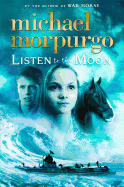
 This uplifting, heartrending story by British author Michael Morpurgo (War Horse) opens in May 1915 in the Scilly Islands, 25 miles off the English coast of Cornwall. Jim Wheatcroft and his son, Alfie, are out in a boat, trying to catch plenty of mackerel for supper, so Alfie's mother won't be upset there's not enough, plus a crab for her twin brother, Uncle Billy, who's out of the asylum now but still in "a world of his own." Just as father and son are fishing near the island of St. Helen's, Alfie hears an "almost human" crying coming from the eerie, centuries-old quarantine site, the Pest House. Alfie and Jim discover a half-starved, nearly lifeless waif, and row her home to Bryher, to the safety of Veronica Farm, where they live. "Lucy" is the only word she speaks, but her gray blanket, marked with the name Wilhelm, identifies her as possibly German--"a lousy Hun," jeers Cousin Dave. Still, "Lucy Lost," who is a mystery, a silent mermaid or ghost child to the whispering locals, is a welcome distraction from the growing list of wartime casualties in France and Belgium.
This uplifting, heartrending story by British author Michael Morpurgo (War Horse) opens in May 1915 in the Scilly Islands, 25 miles off the English coast of Cornwall. Jim Wheatcroft and his son, Alfie, are out in a boat, trying to catch plenty of mackerel for supper, so Alfie's mother won't be upset there's not enough, plus a crab for her twin brother, Uncle Billy, who's out of the asylum now but still in "a world of his own." Just as father and son are fishing near the island of St. Helen's, Alfie hears an "almost human" crying coming from the eerie, centuries-old quarantine site, the Pest House. Alfie and Jim discover a half-starved, nearly lifeless waif, and row her home to Bryher, to the safety of Veronica Farm, where they live. "Lucy" is the only word she speaks, but her gray blanket, marked with the name Wilhelm, identifies her as possibly German--"a lousy Hun," jeers Cousin Dave. Still, "Lucy Lost," who is a mystery, a silent mermaid or ghost child to the whispering locals, is a welcome distraction from the growing list of wartime casualties in France and Belgium.
Sweet, good-natured Alfie makes the best of having a withdrawn, empty-eyed new friend, after all, he's had practice prattling on one-sidedly with Uncle Billy, but it isn't until Dr. Crow brings over his gramophone and plays Chopin that Lucy gets out of bed, and says another word: "Piano." With that word, readers are instantly whisked to New York, two months before Lucy shows up in England. In a section that feels unrelated but is soon connected to the story, a girl named Merry is talking about playing Papa's favorite piece, Mozart's Andante Grazioso, on the piano. But her Canadian Papa has gone off to Europe to fight in World War I, and is now wounded in a hospital in England. Father and daughter had made a promise to think of each other, and Mozart, when they "listen to the moon." Mother and daughter decide they miss Papa too much, and they risk a wartime transatlantic crossing--and the threat of German torpedoes--to join him.
Back on Bryher, Lucy is getting color back in her cheeks, as satisfying as when sickly Mary Lennox starts to blossom in The Secret Garden. The bountiful love of the generous Wheatcrofts, her music and drawing, and a "whiskery old horse" named Peg that won't let anyone but Lucy ride her slowly bring her back to the world. Morpurgo pulls together the perspectives of several of the story's players to solve the puzzle of Lucy's identity, including journals from Dr. Crow and notes from the tyrannical schoolmaster who wants the quiet, talented girl institutionalized. World War I is never far from the islanders' minds, as a once-exuberant boy named Jack Brody with an amputated leg wheels about Bryher. Dr. Crow laments, "[D]o I have to love war to love England?"
Listen to the Moon invites readers into the sights, sounds and smells of island life, with vivid descriptions of the screeching gulls, boats, fish, changing tides, moors and shores, as well as the delightfully nuanced characterizations of the colorful islanders themselves. It is a story that, refreshingly, unwinds at its own pace, mirroring the steady day-to-day kindness and patience of the Wheatcroft family that form the cornerstone of this beautiful novel. Indeed, kindness from unexpected corners saves many lives in this touching wartime story, deepened further by historical notes in the back. --Karin Snelson, children's & YA editor, Shelf Awareness
Shelf Talker: Michael Morpurgo tells a moving story about a girl who's discovered on a deserted island near England's Cornwall in 1915.

